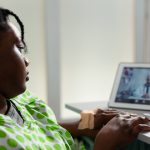English Jill MacDonald, ambassador of Fight Colorectal Cancer, was 37 years old when she was diagnosed with stage 4 colorectal cancer in 2015. “I have been dealing with this for over nine years,” said MacDonald. “I have undergone an unimaginable number of chemotherapy treatments, radiation, surgeries, procedures, etc.” Initially, MacDonald’s symptoms were ignored. “I had consistent night sweats, a little bit of blood in my stools,” she explained. “Sometimes I had a slightly uncomfortable feeling in my abdomen. I had back pain. My doctor told me it was possibly just hemorrhoids.” Unfortunately, MacDonald’s doctor was wrong, and she is one of a growing number of people receiving a colon cancer diagnosis at younger ages than traditional.
Colorectal cancer, the third most common cancer in the U.S., is more frequently diagnosed in older adults. However, the disease is now occurring more often in people under 50 and is now the third most deadly cancer in women aged 20-49. According to a report from the American Cancer Society in March 2023, approximately 19,550 individuals under 50 will receive a colon cancer diagnosis. This marks a 9% increase since 2020. Colorectal cancer diagnosed in someone under 50 is known as early onset colorectal cancer. As more young adults receive diagnoses, doctors and researchers have noted they are more likely to develop an aggressive form of the disease and have a 40% higher chance of being diagnosed at later stages. The five-year survival rate for colon cancer is 90%, dropping to 71% for stage 3 and 14% for stage 4.
Many young people do not think they can have colon cancer, which can lead to diagnosis delays. “The problem is they receive the diagnosis later than expected for older populations because most people do not think they can have cancer,” said Nehal J. Lakhani, M.D., Ph.D., Clinical Research Director at the START Center for Cancer Research Midwest. “They are more likely not to seek medical attention. They might attribute blood in the stools to hemorrhoids or something else.” Additionally, doctors do not typically offer screenings for early onset colorectal cancer in young adults. The U.S. Preventive Services Task Force commonly recommends colorectal screenings for adults aged 45-75. However, millennials, those born between 1981 and 1996, have double the risk of colorectal cancer compared to those born in 1950. “As doctors, we do not recognize symptoms in younger populations because we do not expect them to have cancer based on our general understanding of the disease,” said Lakhani.
Researchers are unsure why more young adults are receiving colon cancer diagnoses. Genetics may play a role, particularly if one has Lynch syndrome. However, that does not explain the increase. Lifestyle factors such as lack of exercise, alcohol and tobacco use, and environmental exposure to toxins and chemicals are considered possible influences.
The National Cancer Institute reports that red or processed meats are associated with a higher risk of colorectal cancer. The World Health Organization classified processed meats as a Group 1 carcinogen, the same certainty level as cigarettes. Red meat is also classified as a carcinogen, but in a lower category as a Group 2 carcinogen.
Socioeconomic status, including education, income, and type of work, may also play a role. Those with lower socioeconomic status have less access to medical resources and poorer health compared to those with higher status. Young adults with lower socioeconomic status may have a higher chance of developing colon cancer. “If you have a lower socioeconomic status, you may not have health insurance,” said Lakhani. “Or you might have access to healthcare, but not of the best quality.”
The signs and symptoms of colorectal cancer in young adults may include blood in the stool, dark or black stools, involuntary weight loss, stomach pain, rectal bleeding, diarrhea, and iron-deficiency anemia. To prevent or reduce the risk of colon cancer, follow a healthy diet, avoid red or processed meats, add plenty of fruits and vegetables, consume a high amount of fiber daily (between 21-28 grams for women depending on age), and maintain physical activity.
Advocate for your rights as testing is commonly recommended for older adults, and healthcare providers may overlook your symptoms. It is important to advocate for your health rights. If you suspect you have colon cancer, quickly visit your healthcare provider and do not accept no for an answer if you wish to be tested. Seek a second opinion if you feel your provider is not listening. If diagnosed with colon cancer, find a good oncologist quickly and address the issue as soon as possible for the best outcomes. This educational resource was prepared with support from Merck.






